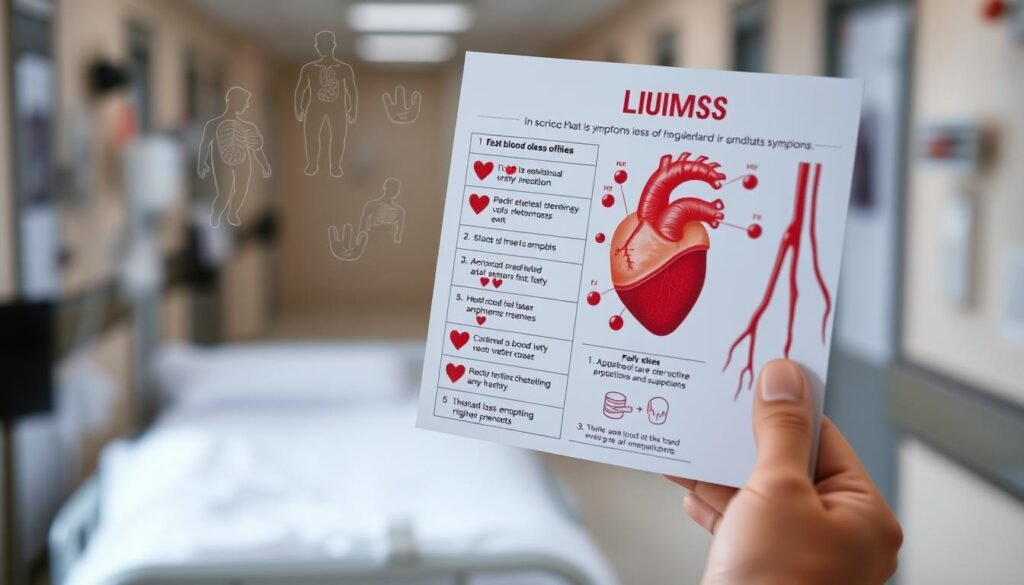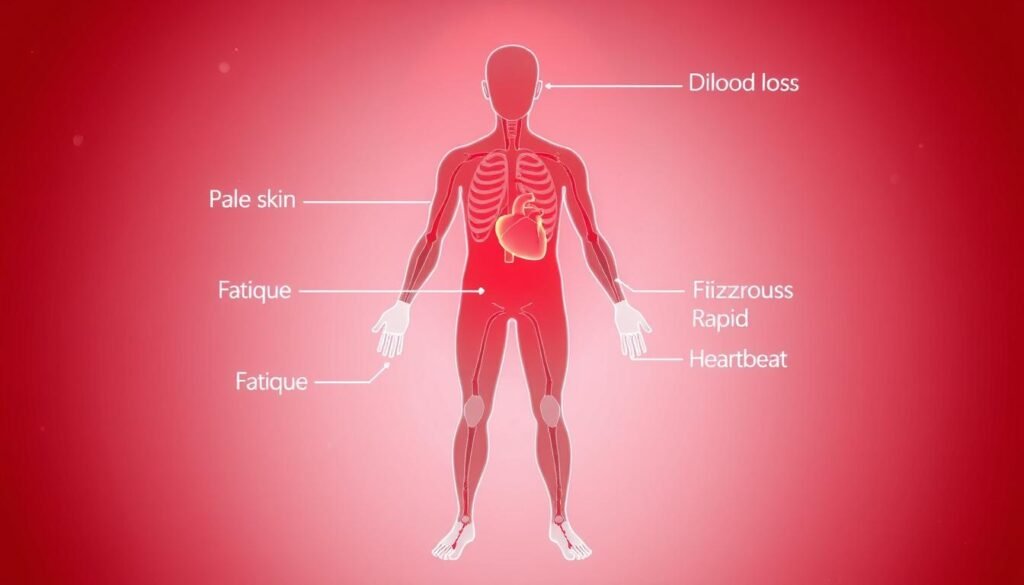Did you know hemorrhagic shock is a top killer in the U.S. for those 1 to 46? It’s due to severe blood loss. Recognizing symptoms like dizziness, fatigue, and a fast heartbeat is crucial. These signs often mean you need urgent medical help.
This guide sheds light on these important signs, especially for people with certain health issues or injuries. By knowing these symptoms, you can get the right care quickly. This can prevent more serious health problems. Check out this resource for tips on how to handle bleeding and when to seek help.
Key Takeaways
- Blood loss symptoms can lead to severe complications if not addressed promptly.
- Recognizing warning signs like dizziness and fatigue is crucial for timely intervention.
- Severe symptoms such as a rapid heartbeat indicate a critical need for emergency medical assistance.
- Understanding hypovolemic shock helps individuals recognize the severity of their condition.
- Immediate action can significantly improve outcomes in cases of hemorrhagic shock.
Understanding Blood Loss
Blood loss happens when our body loses too much blood. It comes from causes of bleeding like accidents, surgeries, or other health issues. For example, cuts, deep scratches, and gunshot injuries can all lead to losing important blood.
Our bodies have red blood cells that carry oxygen everywhere. Losing too much blood faster than making new cells leads to anemia. Anemia means not having enough red blood cells. It’s risky after losing a lot of blood. The body might try to fix it by using water from our tissues. This makes the remaining blood weak.
Sometimes, bleeding is slow and hard to notice. It could be from stomach ulcers or very heavy periods. Diseases like hemophilia or leukemia also affect how much blood we have. Understanding and addressing these issues early is vital. If not, they can cause big problems. This link talks about these issues.
It’s important to get help quickly if bleeding is bad. If someone is bleeding inside, they might start feeling worse suddenly. Knowing causes of bleeding and what they mean is key. It helps in getting the right help fast to avoid danger.
The Importance of Recognizing Blood Loss Symptoms
Knowing how to spot blood loss is crucial for getting help quickly. Quick action lowers the chance of serious problems or death. Signs like feeling dizzy or very tired can mean blood pressure and oxygen are dropping fast.
This immediacy spotlights the importance of watching our health closely. Grasping what these signs mean can save lives in critical times. If you feel dizzy, very weak, or can’t catch your breath, get help right away. For more on blood loss signs, see this resource. It gives key details on losing blood too fast.
It’s important to know what causes blood loss symptoms. Catching these issues early helps avoid worse problems. Be aware if you see signs of bleeding inside the body. Ignoring internal bleeding can have deadly results. For tips on spotting anemia and why quick action matters, check out this informative article.

Common Blood Loss Symptoms
It’s critical to know the signs of blood loss early on. Spotting these symptoms can lead to timely help and treatment. Here are key symptoms that can alert you.
Dizziness
Dizziness can happen if you’re losing blood. This causes your blood pressure to drop. If there’s less oxygen, you might feel light-headed or pass out. This is a sign that you need help right away.
Fatigue
Feeling really tired can mean you’re losing blood. Your body can’t get enough oxygen with fewer red blood cells. You might feel wiped out from doing almost nothing. If you’re this tired, it could be a sign of something serious.
Pale Skin
Pale skin can show up when you lose blood. Your body then keeps blood flow to important organs. Less blood goes to your skin, making it pale. If you’re pale and have other symptoms, you might need to see a doctor fast. Spotting these signs of blood loss early can save your life.

Severe Symptoms of Blood Loss
Severe symptoms of blood loss are urgent. The body tries hard to keep the blood moving and get enough oxygen. Knowing these symptoms helps get help fast.
Rapid Heartbeat
A quick heartbeat is common with blood loss. This is called tachycardia. It means the body is working to give enough oxygen to important organs. A fast heartbeat warns us that there’s a lot of blood lost, and we need to act fast.
Shortness of Breath
Breathing gets hard when there’s a lot of blood loss. There’s not enough oxygen, which changes how we breathe. Feeling very out of breath means we need help quickly. This problem can get worse fast, so it’s urgent.
Cool Extremities
When extremities get cold, it’s because the body is keeping the blood for vital organs. This shows a big reaction to losing blood. Cold hands and feet mean the situation is very serious. It’s time for an immediate medical check.

| Severe Symptoms | Description |
|---|---|
| Rapid Heartbeat | A fast pulse as the body compensates for lost blood volume. |
| Shortness of Breath | Difficulties in breathing due to insufficient oxygen supply. |
| Cool Extremities | Cold hands and feet from reduced blood flow to non-essential areas. |
Recognizing Hypovolemic Shock
Hypovolemic shock is a serious health issue caused by losing a lot of blood or fluids. This can hurt the heart’s ability to work well, affecting blood and oxygen flow to organs. Symptoms include feeling anxious, having cool clammy skin, confusion, and feeling weak.
There are different levels of hypovolemic shock, based on how much blood is lost. For example, Class 1 is a small loss, while Class 4 is very severe. Each level means more urgent need for emergency treatment to avoid things like organ damage or death.
Things like heavy diarrhea, bad burns, or big internal bleeding can cause this shock. Older adults are more at risk. It’s important to get help quickly. Treatment like giving fluids or blood and supporting heart function helps a lot. For more info, take a look at this resource about anemia and related issues.